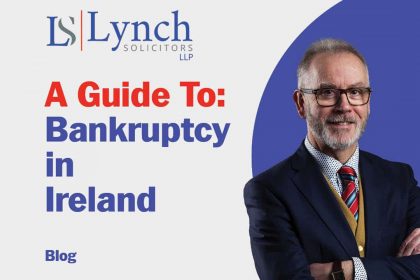
The issue of bankruptcy in Ireland is one mired in much confusion. While the issue has been covered at length in recent years by the media, there is still misunderstanding of what bankruptcy is and what happens to a person that becomes bankrupt. This brief looks at the issue and answers the most commonly asked questions.
What is Bankruptcy?
Bankruptcy is a process where the property or assets of a borrower who is unable or unwilling to pay their debts are transferred to a person who is given charge of the property by the High Court (called the Official Assignee) to be sold. When sold, the costs, expenses, court fees, and certain priority debts of lenders (such as revenue liabilities, local rates, certain employees’ entitlements etc) are paid. After this, the proceeds are divided between all other lenders who are owed money.
The Debtor is then subject to the Bankruptcy period of one year after which they are essentially debt-free. Any amounts outstanding to creditors at that time are written off.
If the Debtor is earning they may be subject to an Income Order for 3 years, these 3 years can begin to run from when they are declared bankrupt. This means that you will receive a figure which represents your reasonable living expenses as determined by lSI guidelines to live off of and anything over and above this will be put towards the payment of your debt.
This is a real option for those who are drowning in unsustainable debt to start again without the weight of their borrowings hanging over them.
What are the main consequences of bankruptcy in Ireland?
On bankruptcy, all your existing debts are written off.
However:
- your assets, including any bank accounts, are frozen;
- in most circumstances, you will be interviewed at the Assignee in Bankruptcy Office or over the telephone;
- you must disclose all your assets, liabilities and earnings;
- the Assignee will assess your income to get voluntary contributions from you over a three year period;
- your bankruptcy is advertised.
The most common restrictions for a bankrupt are that you cannot:
- Obtain credit over €635 without disclosing that you are bankrupt;
- act as a director of a limited company or be involved in its management without leave of Court;
- be involved in a partnership.
You Can:
• earn money either as an employee or self-employed trading under the name you were made bankrupt;
• operate a bank account though this will be in credit at all times;
• retain a motor vehicle so long as the Assignee’s considers it a necessity;
• retain household furniture and effects sufficient for the basic domestic needs of yourself and your family up to €6000
During the period you cannot own anything and anything that you do own on bankruptcy ( eg property) becomes the property of the Assignee. He will take steps to realise assets for the benefit of creditors.
Your Property will be offered first to members of your family giving them the option to purchase your share of the equity before it is placed for sale on the open market.
If the property or any other asset remains unsold when your bankruptcy finishes, it does not revert to you but can still be realised by the Assignee at a later date. For example, a property that may not have any equity in it on bankruptcy may appreciate in value and so cost more to buyback.
Should you receive any legacy or windfall during the period then this will form part of your Estate and must be paid over to the Assignee.
You should co-operate and disclose your whereabouts and earnings and assets to the Assignee or run the risk of prolonging your bankruptcy period to 8 years.
It is now the case that if the family home is in negative equity and remains so for 3 years period that it will re-vest in the bankrupt at the end of that time unless the Assignee applies to sell it.
Contact Us
We have a dedicated practice area for issues related to bankruptcy. Our experts can guide you through the process and discuss the options that are open to you. Call us on 052 6124344 or email: reception@lynchsolicitors.ie to arrange a meeting

